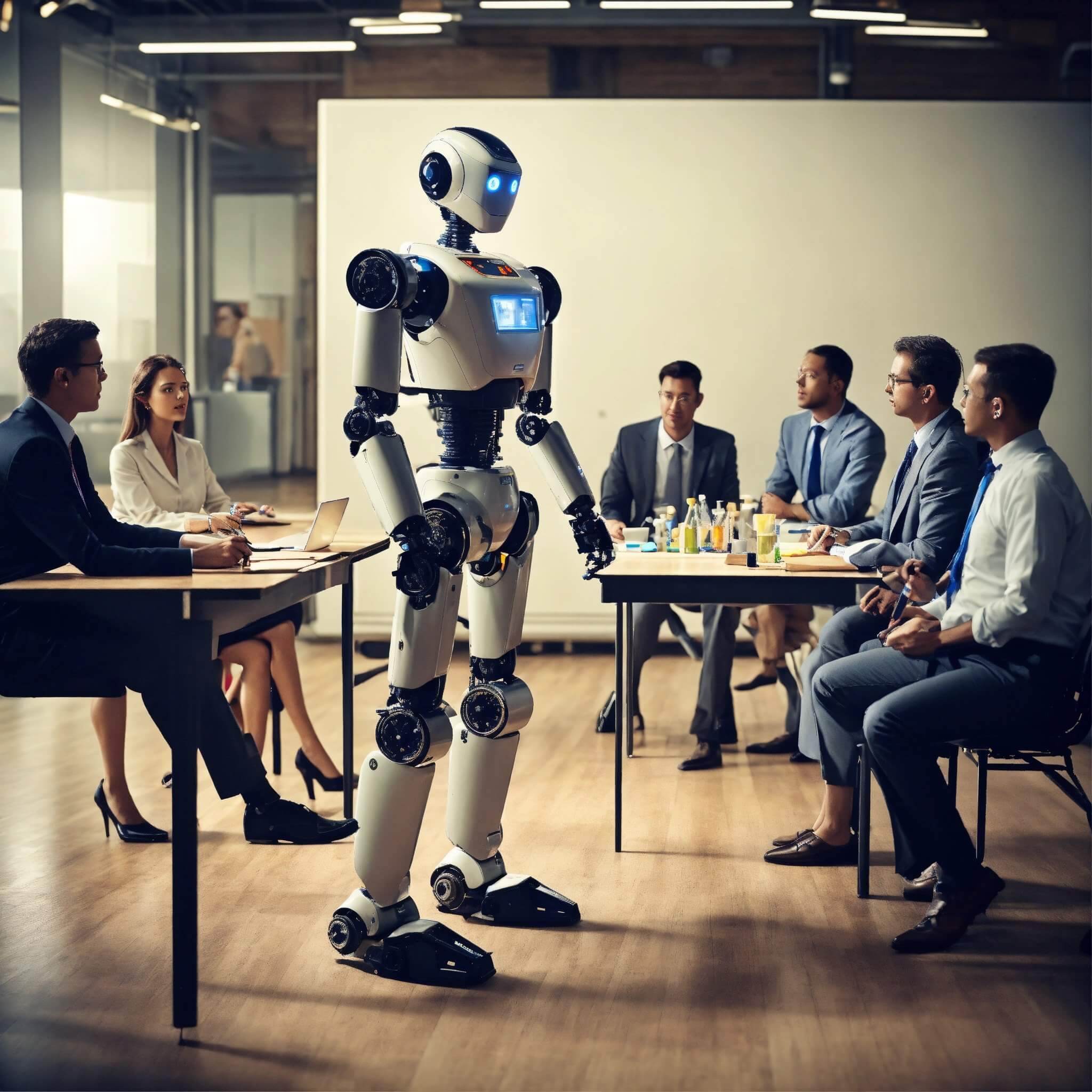Robotics Takeover: Will Automation Replace the Human Workforce?

In recent years, the advancement of technology has had a significant impact on various industries, including the workforce. With the rise of artificial intelligence and automation, the use of robots in the workplace has become more prevalent. While this has brought about many benefits, such as increased productivity and efficiency, it has also sparked debates about the future of human employment. Will robots eventually take over and replace human workers? This question has become a hot topic among economists, policymakers, and the general public. As the development of robotics and automation continues to progress at a rapid pace, it is essential to examine the potential consequences and implications of a potential “robotics takeover.” In this article, we will delve deeper into this ongoing debate and explore the factors that contribute to the increasing use of robotics in the workforce. We will also discuss the potential impact on human workers and the economy as a whole. Whether this is a positive or negative development remains to be seen, but one thing is certain: the rise of robotics is reshaping the way we work and live, and it is crucial to understand its possible repercussions for the future.
Impact on the job market
The growing presence of automation and robotics in various industries has undeniably had a significant impact on the job market. As these technologies continue to advance, they are increasingly capable of performing tasks that were previously exclusive to human workers. While some positions have indeed been replaced by automation, it is crucial to note that this technological shift has also created new job opportunities. The job market has witnessed a significant demand for individuals with expertise in operating and maintaining these advanced technologies. Furthermore, automation has led to the creation of entirely new industries and job roles, such as robotics engineering and programming. Therefore, while automation may have certain implications for specific job fields, it also presents opportunities for individuals to adapt their skills and embrace new roles in the evolving workforce.
Advancements in AI technology
Advancements in AI technology have revolutionized numerous fields, offering unprecedented opportunities for businesses and individuals alike. Machine learning algorithms have become more sophisticated, enabling AI systems to analyze vast amounts of data and make accurate predictions. This has led to significant improvements in areas such as healthcare, finance, and customer service. AI-powered chatbots can now seamlessly interact with customers, providing real-time assistance and enhancing the overall customer experience. Additionally, AI has made groundbreaking strides in medical research, assisting in the diagnosis and treatment of diseases. With continued advancements in AI technology, we can expect further innovations and advancements that will shape the way we live and work.
Increase in efficiency and speed
In today’s rapidly evolving technological landscape, one notable outcome is the remarkable increase in efficiency and speed brought about by automation and robotics. Industries across the board have embraced automation to streamline and optimize various processes, leading to enhanced productivity and cost savings. With the ability to perform repetitive tasks with precision and accuracy, machines have significantly reduced human error, resulting in higher-quality outputs. Moreover, the speed at which automated systems can operate surpasses human capabilities, enabling businesses to meet tight deadlines and deliver products and services promptly. This increased efficiency and speed not only drives operational excellence but also opens up new possibilities for innovation and growth in the workforce.
Potential for job displacement
While the integration of automation and robotics has undoubtedly brought about numerous benefits, there is a growing concern about the potential for job displacement within the workforce. As machines become increasingly advanced and capable of performing complex tasks, there is a real possibility that certain roles traditionally carried out by humans may become obsolete. This is particularly true for jobs that involve repetitive, routine tasks that can be easily automated. As companies strive to improve efficiency and reduce costs, they may opt to replace human workers with machines that can complete tasks more quickly and accurately. This shift in the employment landscape raises important questions about the future of work and the need for individuals to adapt their skill sets to remain employable in an increasingly automated world. Organizations and policymakers must address these concerns and find ways to ensure a smooth transition for workers potentially affected by job displacement.
Demand for new skill sets
With the rapid advancement of technology and the increasing integration of automation and robotics in various industries, there is a growing demand for individuals with new skill sets. As traditional job roles evolve and certain tasks become automated, it has become evident that a workforce equipped with relevant and adaptable skills is crucial for continued professional success. This shift in demand presents an opportunity for individuals to upskill and reskill themselves to meet the changing needs of the job market. Fields such as data analysis, artificial intelligence, digital marketing, and cybersecurity are experiencing significant growth, highlighting the importance of acquiring expertise in these areas. Additionally, soft skills such as critical thinking, problem-solving, and adaptability continue to be in high demand, as they are essential for navigating the complexities of an increasingly automated and interconnected world. Embracing lifelong learning and staying proactive in developing new skill sets will be key to ensuring competitiveness and employability in the face of automation-driven changes.
Ethical implications for automation
As automation becomes more prevalent in various industries, it brings with it a range of ethical implications that need to be carefully considered. One significant concern is the potential displacement of human workers. While automation can improve efficiency and productivity, it also has the potential to lead to job losses and economic inequality. Organizations and policymakers must develop strategies and initiatives that address the impact of automation on the workforce, including retraining and reskilling programs, to ensure that individuals are equipped with the necessary skills to thrive in a technology-driven economy. Additionally, the ethical use of automation must be prioritized, ensuring that it does not result in the violation of privacy rights, biased decision-making, or the erosion of human autonomy. Transparency, accountability, and fairness should be key principles guiding the development and implementation of automated systems to mitigate potential harm and ensure that automation serves the best interests of society as a whole.
Cost savings for companies
With the integration of automation technologies, companies can achieve significant cost savings in various aspects of their operations. By replacing manual tasks with robotic systems, organizations can reduce labor costs and increase productivity. Automation allows for increased efficiency and accuracy in processes, minimizing errors and waste. Additionally, automated systems can optimize resource allocation, leading to improved resource utilization and cost management. Moreover, automation can streamline supply chain management, reducing inventory holding costs and minimizing delivery delays. These cost-saving benefits make automation an attractive investment for companies seeking to enhance their financial performance and competitive advantage in a rapidly evolving business landscape.
Need for retraining and education
In light of the increasing prevalence of automation and robotics in the workforce, there is a growing need for retraining and education to ensure that individuals are equipped with the skills required to thrive in this evolving landscape. As automation takes over certain tasks traditionally performed by humans, workers need to adapt and acquire new proficiencies to remain relevant in the job market. This entails not only learning how to operate and maintain automated systems but also developing critical thinking, problem-solving, and creativity skills that are less susceptible to automation. Furthermore, ongoing education and upskilling initiatives can provide individuals with the necessary knowledge and expertise to transition into roles that complement and work alongside automation technologies. By investing in retraining and education, both individuals and society as a whole can navigate the robotics takeover and harness its potential for enhanced productivity and economic growth.
In conclusion, the rise of robotics and automation has sparked a debate over the potential replacement of human workers in various industries. While some may fear job losses and a lack of job opportunities, others see the potential for increased efficiency and productivity. It is important to consider the ethical implications and potential consequences of this technological advancement, as well as the potential benefits it can bring. As we continue to navigate this changing landscape, it is crucial to prioritize the well-being of both workers and society as a whole. With proper caution and consideration, we can harness the power of robotics and automation to create a more sustainable and innovative workforce.
